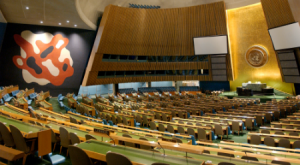General Assembly (GA)
 The General Assembly is one of the six main organs of the United Nations, the only one in which all Member States have equal representation: one nation, one vote. All 193 Member States of the United Nations are represented in this unique forum to discuss and work together on a wide array of international issues covered by the UN Charter, such as development, peace and security, international law, etc. In September, all the Members meet in the General Assembly Hall in New York for the annual General Assembly session.
The General Assembly is one of the six main organs of the United Nations, the only one in which all Member States have equal representation: one nation, one vote. All 193 Member States of the United Nations are represented in this unique forum to discuss and work together on a wide array of international issues covered by the UN Charter, such as development, peace and security, international law, etc. In September, all the Members meet in the General Assembly Hall in New York for the annual General Assembly session.
Our work falls under The following main committees of the GA:
1. Second Committee (Economic and Financial Committee)
2. Third Committee (Social, Humanitarian and Cultural Committee)
The report has been prepared pursuant to General Assembly resolution 74/120 on promoting social integration through social inclusion. The report focuses on digital and financial inclusion and their importance for the overall social inclusion of all, in particular young persons, older persons, persons with disabilities, and indigenous peoples.
In the present report, the Secretary-General emphasizes the need to strengthen national action and regional and international cooperation for social development, focusing on a significant increase and/or more efficient utilization of the resources allocated to social development, in order to achieve the goals of the World Summit for Social Development, taking into consideration the multifaceted impacts of the coronavirus disease (COVID-19) pandemic and its consequences, especially on social development. He examines the impact of the COVID-19 crisis on social development and underscores the importance of developing long-term social policies to enhance people’s capacities and resilience for future shocks, and of preserving social spending to support such national policies and strategies…
The present note examines development challenges in rural areas and presents policy recommendations to promote inclusive and sustainable rural development. The note summarizes the main findings of the World Social Report 2021: Reconsidering Rural Development.
The report provides an analysis of the impact of the coronavirus disease (COVID-19) on older persons and serves to explore pathways to ensure that older persons are better incorporated into efforts to recover from the COVID-19 pandemic in various policy areas. It also features selected work carried out by the United Nations system on ageing and older persons. The report contains key recommendations for consideration by the Assembly
The report provides an overview of the progress achieved in the implementation of the resolution, with a focus on mental health, climate change and biodiversity loss and global technological commons, in the context of rebuilding trust in multilateralism and advancing the common agenda. It was prepared based on input received from Member States, United Nations entities and youth organizations. It concludes with key recommendations for consideration by the Assembly.
The present report is submitted pursuant to General Assembly resolution 74/124. In the report, in view of the coronavirus disease (COVID-19) pandemic, the Secretary General addresses the impact of the crisis on families and elaborates on family oriented policies to mitigate its effects on households. He also focuses on parenting and parenting education as a tool to enhance children’s well-being and resilience in times of crisis and prevent violence against children. Lastly, he addresses the modalities for the preparations for the thirtieth anniversary of the International Year of the Family, in 2024.
The report contains a review of the actions taken by cooperatives to respond to the coronavirus disease (COVID-19) pandemic and the opportunities for achieving sustainable development through cooperatives. The thematic section of the report covers legislative frameworks, including how in successive resolutions on cooperatives in social development, including 74/119, the Assembly has called on Governments to adopt laws or regulations that create an enabling environment for the development of cooperatives and that take into account the values-based identity of cooperatives. In addition, in its resolution 64/136, the Assembly declared 2012 the International Year of Cooperatives, and in successive resolutions thereafter encouraged Member States to continue to share the lessons and best…
 Welcome to the United Nations
Welcome to the United Nations